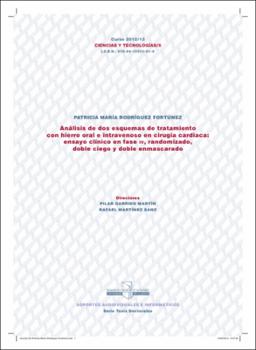Análisis de dos esquemas de tratamiento con hierro oral e intravenoso en cirugía cardiaca : ensayo clínico en fase IV, randomizado, doble ciego y doble enmascarado
Fecha
2014Resumen
Background: Anemia is a frequent complication after cardiopulmonary bypass surgery. Iron therapy has been variably employed by medical centres over the years. Objective: To test the clinical effectiveness of intravenous and oral iron supplementation in correcting anemia, and its impact on blood transfusion requirements, in patients undergoing cardiopulmonary bypass (CPB) surgery. Methods: A double-blind randomized placebo-controlled clinical trial with three parallel groups of patients. Group I (n=54): intravenous iron III-hydroxide sucrose complex, three doses of 100 mg /24 hours during pre- and postoperative hospitalization and 1 pill/24 h of oral placebo in the same period and during one month after discharge. Group II (n=53): oral ferrous fumarate iron 1 pill/24 hours pre- and postoperatively and during one month after discharge, and intravenous placebo while hospitalized. Group III (n=52): oral and intravenous placebo pre- and postoperatively, following the same protocol. Data were collected preoperatively, at theatre, at Intensive Care Unit admission, before hospital discharge and one month later. Results: 1) Baseline clinical and demographic characteristics and surgical procedures were similar in the three groups, 2) no inter-group differences were found in hemoglobin and hematocrit during the postoperative period, 3) the intravenous iron group showed higher serum ferritin levels at hospital discharge (1321±495 ng/mL; P<0.001) and one month later (610±387;P< 0.001) compared with the other groups, and 4) we did not observe statistical differences in blood transfusion requirements between the three groups. Conclusion: The use of intravenous or oral iron supplementation proved ineffective at correcting anemia after CPB and did not reduce blood transfusion requirements.





